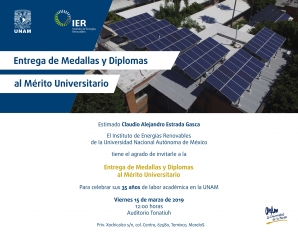Ricardo Pérez-Enciso, Alessandro Gallo, David Riveros-Rosas, Edward Fuentealba-Vidal, Carlos Pérez-Rábago
Abstract
A method to achieve a uniform flux distribution with a multi-faceted point focus concentrator for laboratory tests is proposed in this work. The method can be applied to different types of receiver - thermal or photovoltaic - and no additional device is required to homogenize the flux. The technique consists in moving the receiver from the focal plane and enlarging the solar spot impinging on it. At the same time, each mirror aim-point is adjusted in order to superimpose the images that have been generated by every facet. To evaluate the method, a real multi-faceted concentrator composed of eighteen spherical mirrors was modeled in a ray-tracing software. The procedure was validated through the comparison of an image of the real solar spot on the receiver generated by three mirrors, and the simulated flux obtained the same way. This way a mean concentrator global optical error of 2.8 mrad was estimated. This value was used then for further analyses. Results show that the concentration factor can be varied in a range of 150–900 suns over a receiver diameter of up to 7 cm. Hence, according to the receiver requirements, it is possible to expand the distribution and to alter the intensity of the flux. Finally, optical parametrical analyses were carried out, from which it is inferred that good quality optics give rise to a more homogeneous solar flux on the receiver.
A simple method to achieve a uniform flux distribution in a multi-faceted point focus concentrator

